
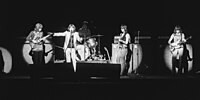


 All five recording line-ups of the Rolling Stones in 1965, 1970, 1975, 2018 and 2022
All five recording line-ups of the Rolling Stones in 1965, 1970, 1975, 2018 and 2022
The Rolling Stones are an English rock band formed in London in 1962. Their first stable line-up included vocalist Mick Jagger, guitarist and vocalist Keith Richards, multi-instrumentalist Brian Jones, bassist Bill Wyman and drummer Charlie Watts. The band currently consists of Jagger and Richards alongside guitarist Ronnie Wood (since 1975), and touring members keyboardist Chuck Leavell (since 1982), backing vocalist Bernard Fowler (since 1989), keyboardist Matt Clifford (who first joined in 1989), bassist Darryl Jones (since 1994), saxophonists Tim Ries (since 1999) and Karl Denson (since 2014), drummer Steve Jordan (since 2021) and female vocalist Chanel Haynes (since 2022).
History
Jagger and Richards first met when they became classmates in 1950 at Dartford, Kent. When Jagger's family moved to Wilmington, Kent in 1954, Jagger formed a garage band with his friend Dick Taylor, who would later be an early bassist for the band. Jagger next met Richards on 17 October 1961 on platform two of Dartford railway station, when they realised they had a shared musical interest, they formed a musical partnership. Richards and Taylor often met Jagger at his house. The meetings moved to Taylor's house in late 1961, where Alan Etherington and Bob Beckwith joined the trio; the quintet called themselves the Blues Boys. The Blues Boys sent a tape of their best recordings to Alexis Korner, who was impressed. On 7 April, they visited the Ealing Jazz Club, where they met the members of Blues Incorporated, who included slide guitarist Brian Jones, keyboardist Ian Stewart, and drummer Charlie Watts. After a meeting with Korner, Jagger and Richards started jamming with the group.
Having left Blues Incorporated, Jones advertised for bandmates in Jazz Weekly in the week of 2 May 1962. Ian Stewart was among the first to respond to the ad. In June, Jagger, Taylor, and Richards left Blues Incorporated to join Jones and Stewart. That same month, the addition of the drummer Tony Chapman, replacing temporary drummer Mick Avory. completed the line-up of Jagger (vocals), Richards (guitar), Jones (guitar), Stewart (piano), and Taylor (bass).
The band played their first show billed as "the Rollin' Stones" on 12 July 1962, at the Marquee Club in London. At the time, the band consisted of Jones, Jagger, Richards, Stewart, and Taylor. Bill Wyman auditioned for the role of bass guitarist at a pub in Chelsea on 7 December 1962 and was hired as a successor to Dick Taylor, after Colin Golding and Ricky Fenson had stints with the band. Chapman, who had brought Wyman into the band, left the line-up and was replaced by Carlo Little before Charlie Watts completed the classic line-up of the Rolling Stones, who played for the first time in public on Saturday, 12 January 1963, at the Ealing Jazz Club. However, it was not until a gig there on 2 February 1963 that Watts became the Stones' permanent drummer.
In May 1963, the Rolling Stones signed Andrew Loog Oldham as their manager. Stewart left the official line-up, due to not matching the band's image, "being too old" and six being too many members. Stewart remained the road manager and touring keyboardist. This line-up remained stable until June 1969, when Jones was fired due to his heavy drug use which limited his contributions in the studio and made him unable to obtain a US visa for touring, On 3 July 1969, less than a month later, Jones drowned under mysterious circumstances in the swimming pool at his home, Cotchford Farm, in Hartfield, East Sussex. The band auditioned several guitarists, including Paul Kossoff, as a replacement for Jones, before settling on Mick Taylor, who was recommended to Jagger by John Mayall.
The Rolling Stones were scheduled to play at a free concert for Blackhill Enterprises in London's Hyde Park, two days after Jones' death; they decided to go ahead with the show as a tribute to him. This was Taylor's first live performance with the band. Taylor's first album with the band was Let It Bleed in late 1969, with posthumous contributions from Jones.
For the band's 1970 European Tour, they were joined by Bobby Keys on saxophone and Jim Price on trumpet and trombone. For their 1971 UK tour they were joined by pianist Nicky Hopkins, who took over duties from Stewart temporarily, though he later returned for the bands 1972 American tour, playing on select songs. After the band's Pacific tour 1973, Price and Hopkins departed the touring band. For the European tour, the band was joined by Steve Madaio on trumpet and flugelhorn, Billy Preston on keyboards and vocals, Trevor Lawrence on saxophone. Manuel Kellough (percussion) and Marshall Chess (trumpet) also joined the band for certain dates. Keys departed on 30 September 1973, to clean up from drink and drugs. This tour was also the last for Taylor before he quit at the end of 1974, due to him not feeling like he fit in.
The band auditioned several guitarists to replace Taylor, including Peter Frampton, Jeff Beck, Robert A. Johnson, Shuggie Otis and Rory Gallagher. Black and Blue session contributors Wayne Perkins and Harvey Mandel also auditioned but were not successful. The band later settled on Ronnie Wood. For the band's Tour of the Americas '75, they were joined by the returning Preston and Stewart alongside percussionist Ollie E. Brown, These musicians also joined the band for their Tour of Europe '76.
For the band's US Tour 1978, they were joined by Stewart and Ian McLagan (who had played with Wood in Faces). These two musicians stayed for the band's American Tour 1981, alongside saxophonist Lee Allen who was replaced by Ernie Watts and the returning Bobby Keys. McLagan was replaced by Chuck Leavell for the European Tour 1982, as well as second saxophonist Gene Barge, It was also the last tour for Ian Stewart who died in December 1985.
The band did not tour again until 1989, when they embarked on the Steel Wheels/Urban Jungle Tour, which ran until 1990. The tour included an extended touring band with Leavell and Keys returning, and new members second keyboardist Matt Clifford, backing vocalist Bernard Fowler and the Uptown Horns (Arno Hecht (saxophone), Bob Funk (trombone), Crispin Ciole (saxophone) and Paul Litteral (trumpet). For the North America and Japanese legs; they were joined by backing vocalists Lisa Fischer, Cindy Mizelle and Pamela Quinlan, and Lorelei McBroom and Sophia Jones for the European tour. This tour was their last with Wyman who left the band in January 1993. Wyman was not officially replaced.
For the band's Bridges to Babylon Tour in 1997, the tour band included the returning Leavell, Keys, Fowler, and Fischer, as well as new members Darryl Jones (bass), Andy Snitzer (saxophone, keyboards), Michael Davis (trombone), Kent Smith (trumpet) and Blondie Chaplin (backing vocals, percussion, guitar). The same musicians, except Snitzer who was replaced by Tim Ries, played on all tours from the No Security Tour in 1999, to the A Bigger Bang Tour from 2005 to 2007. Following the end of the tour in 2007, Chaplin departed. The band did not tour again until 2012, with Matt Clifford rejoining. The tour also included many guests, including former members Bill Wyman and Mick Taylor. Taylor continued to make appearances on the 14 On Fire in 2014, it was also the last tour of Bobby Keys who was replaced by Karl Denson for dates in October and November before Keys' death in December. Fischer departed after the Zip Code tour in 2015, and was replaced by Sasha Allen.
In 2017, the band embarked on the No Filter Tour with the same touring band; this tour continued until 2019, after which shows in 2020 were postponed due to the coronavirus pandemic. Dates were rescheduled to September 2021, and were the first since 1963, without Charlie Watts who had to undergo a medical procedure and died before the final leg of the tour. The band confirmed on 26 August that the tour would continue as planned, with Steve Jordan taking his place in the line-up for the remainder of the tour.
Jordan continued to drum with the band for the Sixty Tour, which included the same band, with Sasha Allen being replaced by Chanel Haynes on 21 June 2022.
Members
Current members
| Image | Name | Years active | Instruments | Release contributions |
|---|---|---|---|---|

|
Mick Jagger | 1962–present |
|
all releases |

|
Keith Richards |
| ||

|
Ronnie Wood | 1975–present |
|
all releases from Black and Blue (1976) onwards, except The Rolling Stones Rock and Roll Circus (1996), Brussels Affair (Live 1973) (2011), Ladies and Gentlemen: The Rolling Stones (2017), On Air (2017) |
Former members
| Image | Name | Years active | Instruments | Release contributions |
|---|---|---|---|---|

|
Brian Jones | 1962–1969 (died 1969) |
|
|

|
Ian Stewart | 1962–1963 (touring/session musician and road manager 1963–1985; his death) |
|
|

|
Bill Wyman | 1962–1993 (guest 2011, 2012, 2023) |
|
|

|
Charlie Watts | 1963–2021 (until his death) |
|
all releases to date |
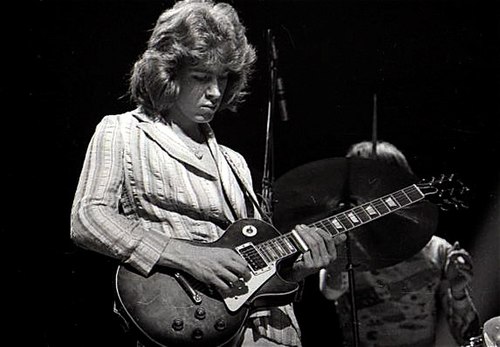
|
Mick Taylor | 1969–1974 (guest 2012–2014) |
|
|
Early members
| Image | Name | Years active | Instruments | Notes |
|---|---|---|---|---|

|
Dick Taylor | 1962 | bass guitar | Taylor was a friend of Jagger's, he played guitar in early lineups before the band joined with Jones. He left the band to continue studies at Sidcup Art College. |

|
Mick Avory | drums | Avory rehearsed with the band in Mid 1962, but denies playing any gigs, despite rumours that he played at their debut gig. | |
| Tony Chapman | Chapman is rumoured to have played with the band at their first official performance on 12 July 1962. He helped get Bill Wyman in the band, but left due to doubts over the band's blues style. | |||
| Colin Golding | bass guitar | Golding played around eight gigs with the band following the departure of Dick Taylor. | ||

|
Ricky Fenson | Fenson also played gigs with the band before Wyman arrived. | ||
| Carlo Little | 1962–1963 (died 2005) | drums | Little played a few gigs with the band in late 1962 and early 1963. |
Touring musicians
| Image | Name | Years active | Instruments | Release contributions |
|---|---|---|---|---|

|
Chuck Leavell | 1982–present |
|
all releases from Undercover (1983) onwards, except Bridges to Babylon (1997), Brussels Affair (2011), Ladies and Gentlemen: The Rolling Stones (2017), On Air (2017), El Mocambo 1977 (2022) and Hackney Diamonds (2023) |
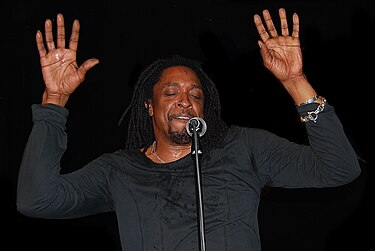
|
Bernard Fowler | 1989–present |
|
all releases from Steel Wheels (1989) onwards, except Brussels Affair (Live 1973) (2011), Blue & Lonesome (2016), Ladies and Gentlemen: The Rolling Stones (2017), On Air (2017), El Mocambo 1977 (2022) and Hackney Diamonds (2023) |

|
Matt Clifford |
|
|
|
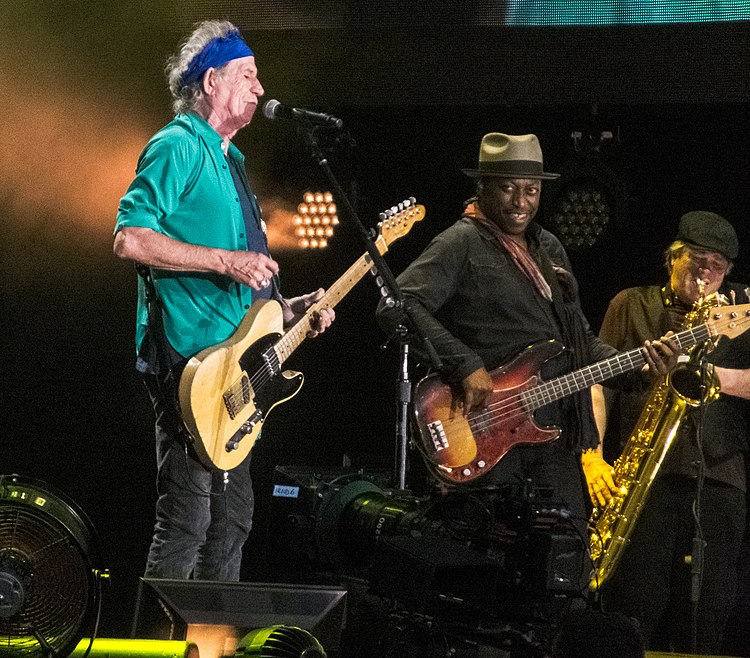
|
Darryl Jones | 1994–present |
|
all releases from Voodoo Lounge (1994) onwards, except Brussels Affair (Live 1973) (2011), Ladies and Gentlemen: The Rolling Stones (2017), On Air (2017), Steel Wheels Live (2020), El Mocambo 1977 (2022) and Hackney Diamonds (2023) |
| Tim Ries | 1999–present |
|
| |

|
Karl Denson | 2014–present | saxophone | Sticky Fingers: Live at the Fonda Theater 2015 (2017) |

|
Steve Jordan | 2021–present | drums | Hackney Diamonds (2023) |
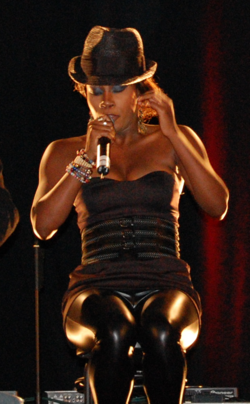
|
Chanel Haynes | 2022–present |
|
none to date |
Former touring musicians
| Image | Name | Years active | Instruments | Release contributions |
|---|---|---|---|---|

|
Bobby Keys |
|
saxophone |
|
| Jim Price | 1970–1973 |
|
| |

|
Nicky Hopkins | 1971–1973 (died 1994) | piano |
|

|
Billy Preston | 1973–1977 (died 2006) |
|
|
| Steve Madaio |
|
|
Brussels Affair (2011) | |
| Trevor Lawrence |
|
saxophone | ||
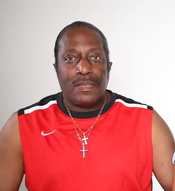
|
Ollie E. Brown | 1975–1976 |
|
|

|
Ian McLagan | 1978–1981 (died 2014) |
|
|
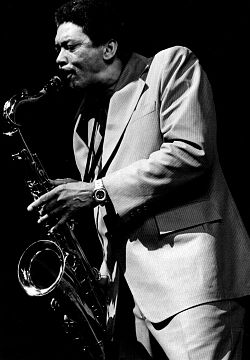
|
Lee Allen | 1981 (died 1994) | saxophone | none |
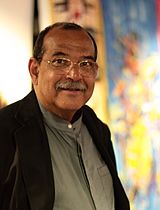
|
Ernie Watts | 1981 | Still Life (1982) | |
| Gene Barge | 1982 | none | ||
| Arno Hecht | 1989–1990 |
| ||
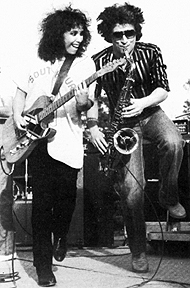
|
Crispin Cioe | |||
| Bob Funk | trombone | |||
| Paul Litteral | trumpet | |||

|
Lisa Fischer |
|
|
|

|
Cindy Mizelle | 1989–1990 | backing vocals |
|
| Pamela Quinlan |
|
none | ||
| Sophia Jones | 1990 | |||
| Lorelei McBroom | Flashpoint (1991) | |||
| Andy Snitzer | 1994–1998 |
|
| |
| Michael Davis | 1994–2007 | trombone |
| |
| Kent Smith | trumpet | |||

|
Blondie Chaplin | 1997–2007 |
|
|

|
Sasha Allen | 2016–2022 |
|
none |
Timeline

Touring timeline

Line-ups
See also: List of The Rolling Stones concert tours| Period | Members | Releases |
|---|---|---|
| May – June 1962 |
|
none – rehearsals only |
| June – October 1962 |
|
none – live shows only |
| October – December 1962 |
| |
| December 1962 – January 1963 |
| |
| January 1963 |
| |
| January – May 1963 |
| |
| May 1963 – June 1969 |
|
|
| June 1969 – December 1974 |
|
|
| December 1974 – January 1993 |
|
|
| January 1993 – August 2021 |
|
|
| August 2021 – present |
|
|
References
- "Mick Jagger | The Rolling Stones". The Rolling Stones. Archived from the original on 3 September 2017. Retrieved 2 October 2017.
- White, Charles. (2003), pp. 119–120, The Life and Times of Little Richard: The Authorised Biography, Omnibus Press.
- ^ Nelson 2010, p. 8.
- "Anniversary of Mick Jagger and Keith Richards Dartford meeting". BBC News. 17 October 2011. Retrieved 13 April 2018.
- Nelson 2010, pp. 10–11.
- ^ Nelson 2010, p. 11.
- ^ Künzler, Hanspeter (12 July 2012). "Rolling Stones celebrate 50 years of raucous rock'n'roll". CNN. Retrieved 10 October 2022.
- Karnbach, James; Bernson, Carol (1997). It's Only Rock 'n' Roll, The Ultimate Guide To The Rolling Stones. Facts On File. Inc. New York. NY. 1997. ISBN 978-0-816-03547-2.
- Wyman, Bill. Rolling With the Stones New York: DK Publishing, 2002. 36. Print
- Palmer, Robert (23 June 1983). "Muddy Waters: 1915–1983". Rolling Stone. Retrieved 23 December 2020.
- Wyman 2002, pp. 36–37.
- Faulk, B. J. (2011). New Left in Victorian Drag: "The Rolling Stones Rock and Roll Circus". Texas Studies In Literature & Language, 53(2), 138–158.
- Doyle, Patrick (12 July 2012). "50 Years Ago Today, the Rolling Stones Played Their First Gig". Rolling Stone. Retrieved 23 December 2020.
- Greene, Andy (21 June 2019). "Watch Bill Wyman Explain How He Joined the Rolling Stones in 1962". Rolling Stone. Retrieved 25 August 2021.
- ^ Davis 2001, p. 52: "As the autumn of 1962 wore on, the Rollin' Stones picked up occasional jobs,... Dick Taylor left the band in September to attend the Royal College of Art. For a couple of months, the bass chores were handled by various people, most often Colin Golding, who probably played around eight gigs..."
- ^ Giles, Jeff (7 May 2022). "Rolling Stones Lineup Changes: A Complete Guide". Ultimate Classic Rock. Archived from the original on 8 July 2017. Retrieved 15 August 2017.
- Wyman 2002, p. 51.
- Richards, Keith (2010), Life, Weidenfeld & Nicolson, p. 121, ISBN 978-0-297-85439-5
- "Andrew Loog Oldham". Rock & Roll Hall of Fame. Retrieved 19 October 2017.
- Greenfield, Robert (19 August 1971). "Keith Richard: The Rolling Stone Interview". Rolling Stone. Archived from the original on 18 April 2017. Retrieved 14 August 2017.
- Greenfield 1981.
- Wyman 2002, p. 329.
- Leonard, Michael (18 March 2013). "Free Spirit: The Genius Of Paul Kossoff". Gibson.com. Retrieved 3 July 2022.
- Carlton, William (5 September 1979). "Mick Taylor seeking new success". Austin American-Statesman. N.Y. Daily News Service. p. 53. Retrieved 3 July 2022 – via Newspapers.com.
- "The Rolling Stones Biography". Rolling Stone. Archived from the original on 30 April 2011. Retrieved 6 June 2006.
- McPherson, Ian. "Track Talk: Sticky Fingers". Retrieved 23 August 2008.
- The Rolling Stones - Let It Bleed Album Reviews, Songs & More | AllMusic, retrieved 8 December 2023
- ^ Doyle, Patrick (2 December 2014). "Rolling Stones Saxophonist Bobby Keys Dead at 70". Rolling Stone. Archived from the original on 3 July 2017. Retrieved 15 August 2017.
- ^ "Jim Price | Biography & History". AllMusic. Archived from the original on 16 August 2017. Retrieved 15 August 2017.
- ^ Welch, Chris (9 September 1994). "Obituary: Nicky Hopkins". The Independent. Archived from the original on 16 August 2017. Retrieved 15 August 2017.
- Staff Writer. "Rolling Stones the Rock Hall's Latest "Music Masters" Honorees". Akron Beacon Journal. Retrieved 8 December 2023.
Most frequently heard performing with Stevie Wonder, trumpeter Steve Madaio was featured on the Rolling Stones' 1973 European tour.
- @stonesdata (5 August 2020). "A rare shot of Mick onstage in Cologne, Germany 1973 with conga player Manuel Kellough in the background" – via Instagram.
- Keys, Bobby; Ditenhafer, Bill (28 February 2012). Every Night's a Saturday Night: The Rock 'n' Roll Life of Legendary Sax Man Bobby Keys (First ed.). Berkeley, Calif.: Counterpoint. ISBN 9781582437835.
- Margotin & Guesdon 2016, p. 420.
- Kot, Greg (12 December 2014). "Mick Taylor to Slash: Rock's irreplaceable guitarists?". BBC. Retrieved 2 June 2018.
- ^ Jagger et al. 2003, p. 174.
- Times, John Rockwell Special to The New York (2 June 1975). "Rolling Stones Still Personify Rock". The New York Times. ISSN 0362-4331. Retrieved 8 December 2023.
- Weber, Bruce (4 December 2014). "Ian McLagan, Keyboardist With the Faces, Dies at 69". The New York Times. ISSN 0362-4331. Retrieved 8 December 2023.
- MacLagan, Ian (1998). All the Rage. Sidgwick & Jackson. ISBN 978-0283063343.
- Krakow, Steve (22 April 2021). "Saxophonist Gene Barge helped shape the sound of Chicago R&B". Chicago Reader. Retrieved 8 December 2023.
- "The Rolling Stones - Beggars Banquet Online - Ian Stewart". Archived from the original on 3 February 2013. Retrieved 7 February 2007.
- Sandall, Robert; Fricke, David (1991). The Rolling Stones: Images of The World Tour 1989-1990. New York, NY: Fireside Books/Simon & Schuster, Inc. ISBN 0671742582.
- McPherson, Ian. "The Rolling Stones Chronicle 1993". Archived from the original on 30 November 2010. Retrieved 26 August 2008.
- "Bridges to Babylon". www.timeisonourside.com. Retrieved 8 December 2023.
- "50 AND COUNTING LONDON: SPECIAL GUESTS BILL WYMAN AND MICK TAYLOR". Archived from the original on 9 June 2013. Retrieved 5 April 2013.
- "Diesel Goes Global: See Karl Denson Perform 1st Concert With The Rolling Stones In 2014". JamBase. Retrieved 9 December 2023.
- Gold, Adam (2 December 2014). "Rolling Stones Saxophonist Bobby Keys Dead at 70". Nashville Scene. City Press LLC. Archived from the original on 8 December 2014. Retrieved 2 December 2014.
- Devlin, Mike (24 March 2018). "After 26 years with Rolling Stones, Lisa Fischer moves to centre stage". Times Colonist. Retrieved 9 December 2023.
- Bliss, Karen (26 March 2016). "The Rolling Stones Give Cubans What They Need, A Two-Hour Free Concert". Billboard. Retrieved 9 December 2023.
- "Rolling Stones Postpone North American Tour Due to Coronavirus (by Matthew Wilkening)". Ultimate Classic Rock. 17 March 2020. Retrieved 17 March 2020.
- "Steve Jordan to Sub for Charlie Watts on The Rolling Stones' Fall Tour". Relix Media. 5 August 2021. Retrieved 13 February 2024.
- Lawless, Jill; Gregory, Katz (24 August 2021). "Drummer Charlie Watts, Rolling Stones backbone, dies at 80". The Associated Press. Retrieved 25 August 2021.
- Vozick-Levinson, Simon (26 August 2021). "Rolling Stones' U.S. Tour to Proceed as Planned After Charlie Watts' Death". Rolling Stone. Retrieved 27 August 2021.
- Greene, Andy (5 August 2021). "Rolling Stones' Charlie Watts Drops Out of U.S. Tour After Medical Procedure". Rolling Stone. Retrieved 5 August 2021.
- Aswad, Jem (5 August 2021). "Rolling Stones Drummer Charlie Watts Is 'Unlikely' to Join Group's 2021 U.S. Tour". Variety. Retrieved 5 August 2021.
- Greene, Andy (29 June 2022). "She Sang 'Gimme Shelter' With the Rolling Stones. Then 'Tina' Producers Fired Her for It". Rolling Stone. Retrieved 9 December 2023.
- ^ "Band". The Rolling Stones. Archived from the original on 10 June 2017. Retrieved 15 August 2017.
- Greene, Andy (8 April 2011). "Rolling Stones Cover Bob Dylan with Original Bassist Bill Wyman". Rolling Stone. New York City: Wenner Media. Retrieved 23 May 2020.
- Lawless, Jill; Gregory, Katz (24 August 2021). "Drummer Charlie Watts, Rolling Stones backbone, dies at 80". Associated Press. Retrieved 25 August 2021.
- ^ "The Rolling Stones: 25 defining moments in their career (2 of 26) Formation and first gig, 1962". The Telegraph. 6 October 2016. Archived from the original on 23 November 2016.
- Fortnam, Ian (26 April 2021). "The Pretty Things: life, legacy, and the original bad boys of rock'n'roll". louder. Retrieved 10 December 2023.
- James Karnbach; Carol Benson (1997). It's Only Rock 'n' Roll: The Ultimate Guide to the Rolling Stones. New York: Facts On File Inc. pp. 57/8. ISBN 0-8160-3035-9.
- Richards 2010, p. Last page of chapter 3.
- "Watch Bill Wyman Explain How He Joined the Rolling Stones in 1962". Rolling Stone. Retrieved 25 August 2021.
- Davis 2001, p. 52.
- "Ricky Fenson Archives". THE EALING CLUB. Retrieved 10 December 2023.
- Unterberger, Richie. "Carlo Little Biography". AllMusic. Retrieved 10 December 2023.
- "Beatles, Stones Sideman Billy Preston Dies". Billboard. 6 June 2006. Archived from the original on 21 September 2014. Retrieved 15 August 2017.
- Brown, Geoffrey F. (11 September 1975). "Billy Preston Talks About His Touring With The Rolling Stones". Jet. Vol. XLVIII, no. 25. Johnson Publishing Company. p. 58 – via Google Books.
- Margotin & Guesdon 2016, p. 458.
- Doyle, Patrick (3 December 2014). "Faces Keyboardist Ian McLagan Dead at 69". Rolling Stone. Archived from the original on 16 August 2017. Retrieved 15 August 2017.
- Parker, Ryan (3 December 2014). "Ian McLagan, famed keyboardist and Rolling Stones collaborator, dies". Los Angeles Times. Archived from the original on 16 August 2017. Retrieved 15 August 2017.
- "'All you have to do is feel': saxophonist Ernie Watts melds jazz and Indian classical music". CBC News. 8 July 2017. Archived from the original on 12 July 2017. Retrieved 15 August 2017.
- Palmer, Robert (10 December 1981). "What Makes the Rolling Stones the Greatest Rock & Roll Band in the World". Rolling Stone. Archived from the original on 16 August 2017. Retrieved 15 August 2017.
- Krakow, Steve (22 April 2021). "Saxophonist Gene Barge helped shape the sound of Chicago R&B". Chicago Reader. Retrieved 10 December 2023.
- Greene, Andy (14 October 2013). "Ex-Beach Boy Blondie Chaplin Reunites With Brian Wilson After 40 Years". Rolling Stone. Archived from the original on 16 August 2017. Retrieved 15 August 2017.
- "New backing vocalist Sasha Allen". The Rolling Stones. Archived from the original on 15 August 2017. Retrieved 15 August 2017.
Sources
- Bockris, Victor (1992). Keith Richards: The Biography. Poseidon Press. ISBN 978-0-671-70061-4.
- Booth, Stanley (2000). The True Adventures of the Rolling Stones. Chicago Review Press. ISBN 978-1-56976-579-1.
- Cohen, Rich (2016). The Sun & the Moon & the Rolling Stones. Random House. ISBN 978-0-804-17923-2.
- Coral, Gus; Hinckley, David; Rodman, Debra (1995). The Rolling Stones: Black & White Blues. Turner Publishing. ISBN 978-1-57036-150-0.
- Davis, Stephen (2001). Old Gods Almost Dead: The 40-Year Odyssey of the Rolling Stones. Broadway Books. ISBN 978-0-7679-0312-7.
- Egan, Sean (2013). The Mammoth Book of The Rolling Stones. Robinson. ISBN 978-1-78033-646-6.
- Gilliland, John (1969). "The British Are Coming! The British Are Coming!: The U.S.A. is invaded by a wave of long-haired English rockers" (audio). Pop Chronicles. University of North Texas Libraries.
- Greenfield, Robert (1981). The Rolling Stone Interviews: Keith Richards. St. Martin's Press/Rolling Stone Press. ISBN 978-0-312-68954-4.
- Greenspan, Edward, ed. (1980). "Regina v. Richards 49 C.C.C. (2d)". Canadian Criminal Cases. Canada Law Book.
- Haslam, Dave (2015). Life After Dark: A History of British Nightclubs & Music Venues. Simon and Schuster. ISBN 978-0-857-20700-5.
- Jagger, Mick; Richards, Keith; Watts, Charlie; Wood, Ronnie (2003). Loewenstein, Dora; Dodd, Philip (eds.). According to the Rolling Stones. Chronicle Books. ISBN 978-0-8118-4060-6. OCLC 53051557.
- Margotin, Philippe; Guesdon, Jean-Michel (25 October 2016). The Rolling Stones All the Songs: The Story Behind Every Track. Running Press. ISBN 978-0-316-31773-3.
- Marshall, Jim (2012). The Rolling Stones 1972. Chronicle Books. ISBN 978-1-4521-2180-2.
- McLagan, Ian (2000). All the Rage: A Riotous Romp Through Rock and Roll History. St. Martin's Press. ISBN 978-0-8230-7842-4.
- Moon, Tom (2004). "The Rolling Stones". In Brackett, Nathan; Hoard, Christian (eds.). The New Rolling Stone Album Guide. Fireside. pp. 695–699. ISBN 978-0-7432-0169-8.
Portions posted at "The Rolling Stones Album Guide". Rolling Stone. Archived from the original on 12 April 2011. Retrieved 22 November 2014. - Nathan, David; Lindsay, Susan Gedutis (2001). Inside the Hits. Berklee Press. p. 217.
- Neill, Andy (2015). Keith Richards: A Life in Pictures. Omnibus Press. ISBN 978-0-857-12873-7.
- Nelson, Murray N. (2010). The Rolling Stones: A Musical Biography. Greenwood. ISBN 978-0-313-38034-1.
- Norman, Philip (2001). The Stones. Sidgwick & Jackson. ISBN 978-0-283-07277-2.
- Oldham, Andrew Loog (2000). Stoned. St. Martin's Griffin. ISBN 978-0-312-27094-0.
- Patell, Cyrus R.K. (2011). Rolling Stones' Some Girls. A&C Black. p. 24.
- Paytress, Mark (2003). Rolling Stones: Off the Record. Omnibus. ISBN 978-0-7119-8869-9.
- Perone, James (2012). The Album: A Guide to Pop Music's Most Provocative, Influential, and Important Creations. ABC-CLIO. ISBN 978-0-313-37906-2.
- Richards, Keith; Fox, James (2010). Life (1st ed.). Little, Brown and Company. ISBN 978-0-297-85439-5. OCLC 548642133.
- Sandford, Christopher (1999). Mick Jagger: Primitive Cool. Cooper Square Press. ISBN 978-0-8154-1002-7.
- Sandford, Christopher (2003). Keith Richards: Satisfaction. Caroll & Graf. ISBN 978-0-7867-1368-4.
- Schinder, Scott; Schwartz, Andy (2010). Icons of Rock: An Encyclopedia of the Legends Who Changed Music Forever. ABC-CLIO. p. 230.
- Szatmary, David P. (2014). Rockin' in Time (8th ed.). Pearson.
- Wells, Simon (2012). The Great Rolling Stones Drug Bust. Omnibus Press. ISBN 978-0-857-12711-2.
- Wyman, Bill (1990). Bill Wyman, Stone Alone: The Story of a Rock 'n' Roll Band. Viking. ISBN 978-0-670-82894-4.
- Wyman, Bill (2002). Rolling with the Stones. DK Publishing. ISBN 978-0-7894-8967-8.